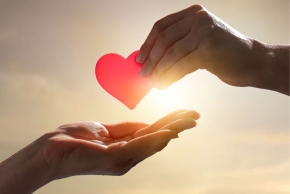Giving, a happiness-producing action: elements of scientific proof
Researchers have shown that making a donation activates the brain’s reward pathways, which reinforces our well-being. A 2006 study led by Jorge Moll* revealed that giving stimulates areas of the brain such as the nucleus accumbens, associated with pleasure, producing satisfaction similar to that which is felt after earning a tangible reward. This activation is visible via functional MRI, a proof that a donation can provoke similar sensations to earning a material reward.
How donations stimulate our brains and our emotions
Faire un don libère des hormones telles que la dopamine et l’ocytocine. La dopamine, souvent associée à la satisfaction, est également libérée lors de moments plaisants comme écouter de la musique ou admirer une œuvre d’art. L’ocytocine, surnommée "l'hormone du bonheur", joue un rôle central dans le renforcement des liens sociaux et des sentiments de bonheur. Lorsqu’elle est libérée lors d'un acte de générosité, elle amplifie notre bien-être et nous encourage à tisser des liens sociaux.
Giving, a pleasure with no counterpart
Another study from 2007 led by William Harbaugh* explored the “warmth of donation”, this pleasure felt with no expectation of compensation. Participants felt true satisfaction when making a donation, underlining the inherent nature of the pleasure felt. This “warmth of donation” adds to the idea that generous gestures can be a lasting source of well-being.
Benefits for oneself and others
In 2013, Elizabeth W Dunn. and Michael I. Norton* studied the impact of making a donation on personal well-being. They discovered that donating for a significant cause is followed by a sense of increased satisfaction, even in the absence of thanks. This effect is particularly strong when the donation is made anonymously, a proof that generosity in and of itself has an effect on personal happiness.
Why make donating a part of daily life?
By making generosity a part of daily life, we can increase our well-being while reinforcing our social bonds and contributing to a supportive society. Make a donation today to experience this feeling of happiness and satisfaction, and get involved in tangible actions for significant causes.
Discover our programs and make a donation today!
These studies confirm that donations activate the brain’s reward system, causing a feeling of satisfaction similar to receiving a tangible reward. Donating is beneficial not only for the recipients, but also for those who share, thus reinforcing social involvement and happiness.
Want to experience this yourself? Discover our programs and make a donation right now!
* Scientific studies:
1. Moll, J., et al. (2006). “Human fronto–mesolimbic networks guide decisions about charitable donation.” Proceedings of the National Academy of Sciences, 103(42), 15623-15628. This study revealed that choosing to make a donation activates the brain’s mesolimbic pathways, which are involved in receiving rewards.
2. Harbaugh, W. T., et al. (2007). “Neural responses to taxation and voluntary giving reveal motives for charitable donations.” Science, 316(5831), 1622-1625. The researchers observed that voluntary contributions activate areas of the brain involved in rewards, suggesting that donations are inherently rewarding.
3. Dunn, E. W., & Norton, M. I. (2013).“Prosocial spending and happiness: Using money to benefit others pays off.” Current Directions in Psychological Science, 22(4), 326-333. This study indicates that spending money on other people augments personal well-being by activating the brain’s reward pathways.
